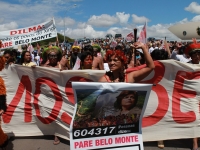Norte Energia yet to Properly Compensate Victims of Belo Monte Dam in Brazil

Photo: International Rivers. Used under Creative Commons license.
“The company wants to weaken us, undermine our strength and impoverish our fight, it wants to kill us slowly, leave us starving like it does with the Xingu River and the fish that inhabit the waters of the rivers.”
- November 2022 letter from the council of the traditional peoples of the middle and lower Xingu River.
Belo Monte dam on the Xingu River in the Amazon rainforest in the state of Pará, Brazil, is the fifth largest dam in the world. Completed in 2019, it now generates 11.2 gigawatts of power, but its construction has caused the river’s flow to drop to a quarter of its previous volume near the dam site, displacing an estimated 55,000 people in the region. Fish stocks have collapsed since the dam was built, which in turn has affected the diet and livelihood of riverside dwellers, especially Indigenous communities. It also caused crime rates to skyrocket in the region.
The dam was built by Norte Energia, a consortium of six companies that was created with the specific purpose of building the dam. The largest shareholder is Grupo Eletrobras, which was owned by the government of Brazil until it was privatized in 2021. Another significant shareholder is Neoenergia, the Brazilian subsidiary of Iberdrola, which is based in Bilbao, Spain.
Leading the battle to force Norte Energia to compensate the affected communities is the office of the Federal Public Prosecutor, an institution charged with defending the public good, that is independent of the executive, legislative, and judicial branches of government.
In July 2015, four years before the dam was completed, the Federal Public Prosecutor's Office brought a lawsuit in a federal court in the state of Pará, alleging that Norte Energia and the government of Brazil were engaged in “ethnocide.”
“What is under way with the Belo Monte dam is a process of ethnic extermination, through which the federal government continues the colonial practices of integrating Indigenous peoples into the hegemonic society,” the lawsuit alleged.
Nevertheless, dam construction went ahead. The project was finally completed in 2019 and it was inaugurated by Jair Bolsonaro, the president of Brazil at the time.
Three years later, in August 2022, the Federal Prosecutor’s Office invited local communities to testify about the impact of the dam – and hundreds showed up to tell stories of being forced to seek donations to pay for basic food supplies, and of how they had to go without electricity due to lack of money to pay bills.
“People came from all over to eat the fried fish here in Belo Monte,” Maria Francineide, a fisherwoman, told the hearing. “That's over. Because the fish ran out. Poverty, misery, infertile river, disease, this is the legacy of Norte Energia in Xingu. We had dignity, we fished, we bought our food, we lived well. Today, it's all over.”
“They took what's ours, they took our fish and they took our lives," said fisherman Áureo da Silva Gomes, who lives in the plant's reservoir area.
The testimony confirmed the findings of a July 2015 report by the Federal Prosecutor’s Office that found that the riverside dwellers who were resettled received unsuitable compensation. It also documented the undernourishment of Indigenous children, increase in chronic diseases, consumption of alcohol and illegal drugs as well as an increase in sexually transmitted diseases as a result of Indigenous women taking up sex work.
The Federal Public Prosecutor’s Office estimated that some 30 tons of fish were killed during dam construction between 2015 and 2019, recommending that Norte Energia be fined R$69 million (US$13.5 million).
Others say the dam has also introduced new problems to the region – environmental as well as social. For example, Norte Energia has been fined R$1 million (over US$195,000) for dumping 8-16 times the allowed waste level into the Xingu.
And Altamira, the city closest to the dam, has become one of Brazil's most dangerous cities, with the highest murder rate of any city in the country (107 per 100,000 inhabitants).
“[The dam] interfered a lot in our culture. Many young people from the village no longer want to respect our culture. The white culture became very strong when these companies entered," Mobu Odo, an Indigenous chief from the Arara people, told Brasil de Fato.
“This is how the company sees us: get out of the way so I can get past you. The company should see us as citizens because we are victims of this dam. Because we had everything and now, we have nothing,” Raimunda Gomes da Silva, a riverside dweller, told the Brazilian Society for the Progress of Science.
Five years after the lawsuit was filed - in November 2020 - the federal court in Altamira, Pará, ruled in favor of the Federal Public Prosecutor’s Office and recognized the allegations of ethnocide. The court ordered Norte Energia to install a council, an Indigenous committee, and a management plan with representatives of affected Indigenous groups.
This past November - two years after the court ruling - Norte Energia proposed to pay R$20,000 (US$3,909) in compensation to each of the fisherfolk who had officially registered as impacted by the project – who number just 1,976, less than a third of the 7,000 estimated as affected by the Federal Public Prosecutor’s Office, and a fraction of the 55,000 estimated to have been indirectly affected.
Still a glimmer of hope has emerged for the victims of the dam with the appointment of the renowned Indigenous leader Sônia Guajajara to head up Brazil’s newly created Ministry for Indigenous People this past January.
“We don't need more Belo Montes,” Guajajara told Luiz Inácio Lula da Silva, then a candidate for president, at the 2022 Acampamento Terra Livre (Free Land Camp), the largest gathering of Indigenous groups in Brazil. “What we want is our territory, our way of life, respected, protected.” Now that Guajajara has taken up national office, the question is whether she can use her power to do something for the communities of the lower Xingu.



